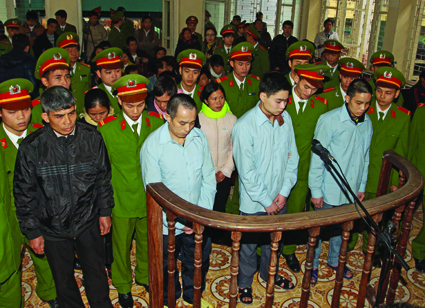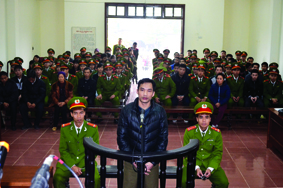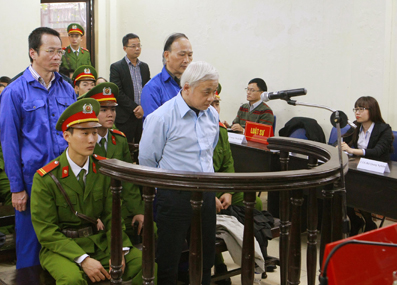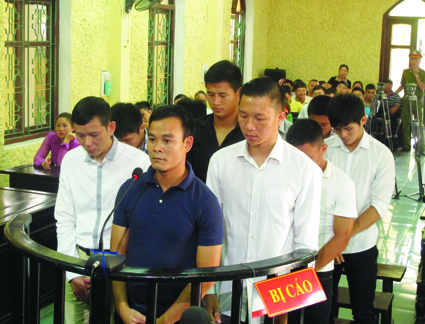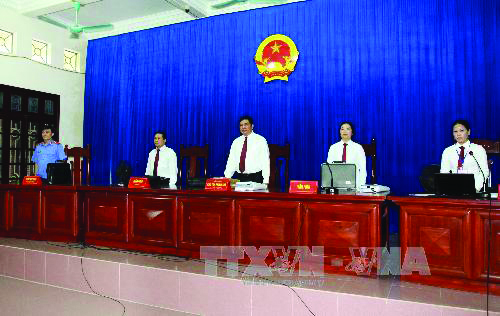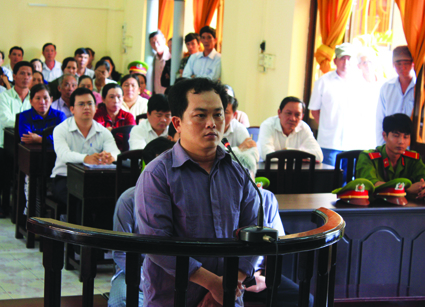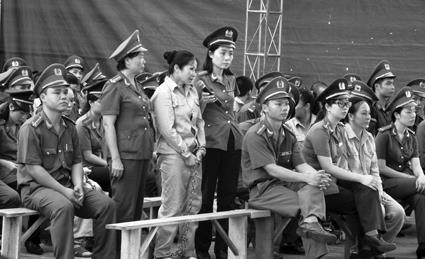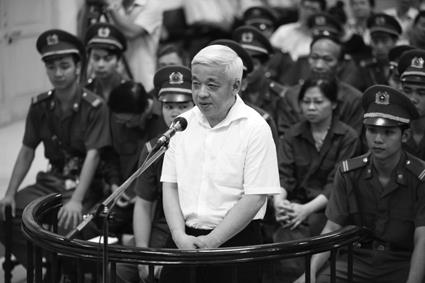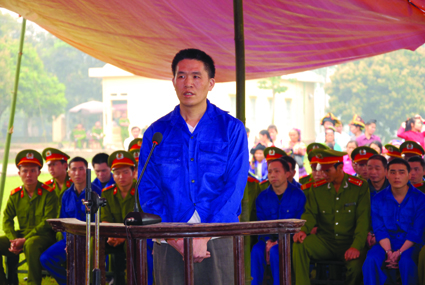Truong Hoa Binh
Secretary of the Party Central Committee
Chief Justice of the Supreme People’s Court
According to the 2015 legislative program of the National Assembly, revisions to the Civil Procedure Code, Criminal Procedure Code and Administrative Procedure Law will be considered and passed this year by the legislative body. These revisions will focus on the jurisdiction of each court level, exercise of judicial power, the adversary principle and enforcement of court rulings.
Requirements on revision of procedural laws
The Civil Procedure Code, Criminal Procedure Code and Administrative Procedure Law are basic procedural laws that directly regulate the organization and operation of procedure-conducting agencies, including people’s courts, help maintain social and legal order, safeguard justice, and protect the people’s lawful rights and interests.
The revision of these laws aims to meet the following requirements:
Institutionalizing the Party’s judicial reform guidelines
The judicial reform guidelines have been laid down in the Political Bureau’s Resolution No. 49-NQ/TW of June 2, 2005, on the Judicial Reform Strategy through 2020, and Resolution No. 48-NQ/TW of May 24, 2005, on the Strategy for Building and Improvement of the Vietnamese Legal System through 2010, with orientations toward 2020, the review report on eight years’ implementation of Resolution No. 49-NQ/TW and the Political Bureau’s Conclusion No. 92-KL/TW of March 12, 2014.
These guidelines include:
+ Renovating the organization and operation of people’s courts for the goal of a clean, strong, democratic, strict, justice-protecting and gradually modernized justice that serves the people and the Socialist Fatherland of Vietnam;
ensuring that judicial activities, among which adjudication activities play the key role, are highly effective and efficient;
+ Improving judicial procedures by inheriting the advantages of the inquisitorial proceeding system and selectively absorbing progressive elements of the adversarial proceeding system, ensuring synchrony, democracy, publicity and transparency, and respect for and protection of human rights; closely combining the renovation of judicial procedures with the reform of judicial administrative procedures to suit the characteristics of judicial activities;
+ Exploring the possibility of using court precedents and customs (including also international commercial customs and practices) and rules of professional associations to complement the law;
+ Reforming administrative procedures within judicial agencies in order to facilitate access to justice for citizens;
+ Broadening the jurisdiction of courts to settle administrative complaints and lawsuits; drastically reforming procedures for settling administrative complaints and lawsuits at court; facilitating citizens’ participation in legal procedures and ensuring equality between citizens and authorities before court; creating mechanisms to make sure that all legally effective court judgments are enforced and violating administrative agencies strictly execute these judgments;
+ Renewing the way of holding court hearings, defining more explicitly the position, powers and responsibilities of procedure-conducting persons and the rights and responsibilities of procedure participants so as to ensure publicity, democracy and strictness; raising the quality of the adversarial process at court hearings, considering it a breakthrough in judicial activities;
+ Increasing powers and responsibilities of judges so that they can be more active in performing their duties and enjoy greater independence and assume higher responsibility before law for their procedural acts and decisions;
+ Improving the mechanism to help lawyers better engage in the adversarial process at court hearings, and clearly defining their responsibilities;
+ Establishing a mechanism for conducting trials by summary procedure for certain cases;
+ Improving step by step cassation and reopening procedures with more specific provisions on grounds for making protests and on the accountability of persons who make protests against legally effective court judgments and decisions, aiming to put an end to the situation of rampant and groundless protests;
+ Creating a mechanism for tighter control among related agencies in implementing judicial activities;
+ Further studying and elaborating the theory on judicial power in a socialist law-ruled state, providing a clear definition of judicial power and forming a mechanism for the court system to effectively exercise this power;
+ Inheriting the national legal tradition and achievements of the Vietnamese socialist justice, and learning from universal values of the mankind which are suitable to Vietnam’s reality.
 |
| Six defendants being former police officers at the hearing for their crime of using corporal punishment in Phu Yen province __Photo: Xuan Trieu/VNA |
Concretizing the provisions of the 2013 Constitution and implementing the new Law on Organization of People’s Courts
Chapter VIII of the 2013 Constitution stipulates: “The people’s courts are the judicial bodies of the Socialist Republic of Vietnam and exercise judicial power; have the duty to safeguard justice, human rights, citizens’ rights, the socialist regime, the interests of the State, and the lawful rights and interests of organizations and individuals.”
People’s courts are organized at four levels, including the Supreme People’s Court, superior people’s courts, provincial-level people’s courts, and district-level people’s courts. The Supreme People’s Court is the highest judicial body of the Socialist Republic of Vietnam. The Judicial Council of the Supreme People’s Court is responsible to conduct trials according to cassation or reopening procedure and select and issue court precedents for judges and assessors to study and apply in trials. First-instance trials by people’s courts must be participated by assessors, except in the case of trial by summary procedure. During a trial, judges and assessors are independent and obey only the law. Agencies, organizations or individuals are prohibited from interfering in a trial by judges and assessors. People’s courts try cases on a collegial basis and make decisions by a vote of the majority, except in the case of a trial by summary procedure. The adversarial principle is guaranteed in trials. The first-instance and appellate hearing system is guaranteed. In the course of settling cases, courts may propose competent agencies to amend, supplement or annul legal documents which are contrary to the Constitution, laws, ordinances or resolutions of the National Assembly or National Assembly Standing Committee to guarantee lawful rights and interests of individuals, agencies or organizations, and guarantee the right of the accused and defendants to be presumed innocent in criminal proceedings.
The above provisions need to be incorporated in the revised procedural laws to complete legal grounds for implementation, and ensure the uniformity and consistency of the legal system.
Addressing existing problems in adjudication activities
Revisions to the procedural laws must be based on reviewing trial practices in order to address limitations and problems and perpetuate appropriate and effective provisions.
Trial practices show that the jurisdiction of each court level defined in the current procedural laws is not really reasonable, the rights and obligations of procedure-conducting persons and procedure participants are incomplete, and the right to access and exchange evidence between involved parties in civil and administrative procedures is not provided yet. The concept of adversarial process remains unclear and unspecific, leaving the procedures for questioning and argument in court hearings unfavorable to the exercise of the adversarial right. The cassation procedure and grounds for making protests still see inadequacies which must be addressed. The enforcement of court judgments and decisions, especially administrative ones, remains poor, falling short of public expectations.
The above limitations and problems should be summarized and discussed so as to design appropriate revisions with a view to improving the settlement of criminal, civil and administrative cases in light of the judicial reform.
Major orientations for revision of procedural laws
To meet the above requirements, in the course of revision of the procedural laws, attention should be paid to the following basic issues:
Adjusting the jurisdiction of courts at all levels
In the four-level court system provided in the 2014 Law on Organization of People’s Courts, the Supreme People’s Court no longer conducts appellate trials but conduct only trials according to cassation or reopening procedure. Superior people’s courts have the duty to conduct appellate trial of cases for which provincial-level people’s courts’ first-instance judgments and decisions which have not yet taken effect are appealed or protested against, and conduct according to cassation or reopening procedure trial of cases for which effective judgments and decisions of courts based in regions under the superior people’s courts’ jurisdiction are protested against. Provincial-level people’s courts have the duty to conduct appellate trial of cases for which district-level people’s courts’ first-instance judgments and decisions are appealed or protested against, and conduct first-instance trial of some cases falling beyond the jurisdiction of district-level people’s courts. District-level people’s courts have the duty to conduct first-instance trial of almost all cases falling under their jurisdiction.
So, the jurisdiction of each court level should be considered and adjusted to ensure synchrony and unity. For instance, regarding administrative cases, the administrative tribunals of provincial-level people’s courts should be assigned to accept and settle according to first-instance procedure lawsuits against district-level People’s Committees and their chairpersons, while superior people’s courts may try these cases if there are appeals or protests. The designing of procedural laws in this direction is quite appropriate and ensures the principle of “independent trial” enshrined in the Constitution.
Facilitating the exercise of judicial power
That people’s courts exercise judicial power is a very important provision in the 2013 Constitution. To implement this provision, there must be specific regulations prescribing the order, procedures and specific methods for courts to exercise their powers and perform their duties provided in the 2014 Law on Organization of People’s Courts, especially the power and duty to discover and propose competent agencies to revise or annul legal documents which are contrary to the Constitution, laws, ordinances and resolutions of the National Assembly and National Assembly Standing Committee. Regulations on selection and issuance of court precedents and principles for application of court precedents in trials should also be made. The order, procedures and cases of examination, verification and collection of evidence by courts in the process of adjudicating criminal cases should be established. Contempt of court should be clearly defined for strict punishment.
Protecting and enhancing the independence of judges and assessors
The revised procedural laws should specify acts that are regarded as interfering in trials, such as putting pressure on or influencing judges and assessors or spreading false information on the settlement of cases. Severe disciplining, administrative or criminal penalties against interferers should also be meted out.
To ensure independence of the judiciary, it is necessary to review the limit of first-instance trial of criminal cases provided in Article 196 of the Criminal Procedure Code, which says that: “Courts may only adjudicate defendants and offenses which have been prosecuted by procuracies and decided by courts to be brought for trial.” In case the adversarial process in a court hearing results in an offense different from the offense prosecuted by the procuracy, this provision turns out to contravene the 2013 Constitution that upholds the adversarial principle in court hearings and the Party’s judicial reform resolutions insisting that court judgments must be based on results of the adversarial process in court hearings.
In reality, there are some cases in which the court, though having detected that a defendant committed another offense, which carried a penalty heavier than that for the offense prosecuted by the procuracy, had no choice but rule that such defendant committed the offense prosecuted by the procuracy. This has caused public mistrust and discontent, especially in cases of corruption or organized crime.
Therefore, the above-said court trial limit should be removed in order to enable trial panels to make, based on sufficient evidence comprehensively examined in the adversarial process and the real nature and severity of criminal acts, lawful and fair verdicts different from indictments of procuracies.
Besides, if detecting, through the adjudicating and adversarial process, new offenses committed by defendants, courts should be vested with the power to institute new criminal cases right at their hearings so as to thoroughly settle the cases. If evidence is insufficient, courts may return case files for additional investigation or collect additional evidence by themselves. This is totally in line with the constitutional principles of “independence of judges and assessors during a trial” and “guarantee of the adversarial process by courts.”
It is also necessary to guarantee that judges and assessors would not be subject to disciplining, examination for penal liability or payment of compensation for their views or rulings made while exercising adjudicating power, except the case of intentional violation. The disciplining or examination for penal liability of any judges must be consented by the National Council for Judge Selection and Supervision. These provisions would constitute a legal mechanism to help judges and assessors obey only the law and have firm self-confidence to examine evidence when performing their duties.
Guaranteeing the adversarial principle in trials
As an important requirement of the judicial reform already enshrined in the 2013 Constitution, the adversarial process must be implemented throughout the course of trial, not only in court hearings. In the revised procedural laws, this principle must be elaborated and expressed in the provisions on the rights and obligations of procedure participants, the scope of the adversarial process from the time a court accepts the case file to the time the case is wrapped up, the responsibility of courts, judges and assessors to guarantee the right of involved parties to engage in the adversarial process and guide adversary parties in collecting, presenting and exchanging evidence and making arguments and counter-arguments by themselves or with the help of defense counsels or others for the settlement of cases and protection of their lawful rights and interests.
Specifically, it is necessary to revise the provisions on rights and obligations of procedure-conducting persons and procedure participants, especially the right to collect and provide evidence, the right of involved parties to access evidence in civil and administrative procedures, the right to be presumed innocent in criminal procedure, and the right of involved parties to request the court to summon witnesses who they believe can help defend their views and arguments. More favorable procedures should be established for the effective participation of defense counsels in legal proceedings.
Revising cassation and reopening procedures
The competence for and methods of conducting trials according to cassation or reopening procedure should be changed in accordance with the 2014 Law on Organization of People’s Courts to fit the jurisdiction of each court level in the four-level court system. Grounds for making protests according to cassation or reopening procedure should also be added or further clarified.
Since cassation and reopening trials can constitute a separate trial tier, the provisions on cassation and reopening trial competence should be revised to allow cassation trial panels to modify effective judgments and decisions if having sufficient grounds, with a view to putting an end to the prolonged settlement of cases due to repeated first-instance or appellate trials and enabling the Supreme People’s Court to develop court precedents in the spirit of the judicial reform and in accordance with the 2014 Law on Organization of People’s Courts.
Payment of a fee upon filing a request for cassation trial should be considered to ensure the interest of requesting parties and feasibility of the examination and settlement of the request. The question is whether this fee should be paid for all three types of procedures or only civil and administrative procedures.
To address problems in the settlement of requests for cassation trial, it is possible to refer to the application of procedures for second-time appellate trials. Accordingly, the judicial committees of superior people’s courts may conduct second-time appellate trials for cases previously tried according to appellate procedures by special tribunals of these courts.
Reconsidering the special procedure for reviewing cassation and reopening trial decisions of the Judicial Council of the Supreme People’s Court
Clause 1, Article 104 of the Constitution stipulates: “The Supreme People’s Court is the highest judicial body of the Socialist Republic of Vietnam.” Clause 4, Article 22 of the Law on Organization of People’s Courts also stipulates: “Cassation or reopening trial decisions of the Judicial Council of the Supreme People’s Court are the highest and cannot be protested against.”
However, in order to have a mechanism for protecting the lawful rights and interests of involved parties, the existing provisions in the procedure law on the special procedure for the Judicial Council of the Supreme People’s Court to review its own decisions should be retained. However, when reviewing its decision according to the special procedure, the Judicial Council should only make conclusion on the lawfulness of the decision and determine the responsibility to pay compensations and the rights of parties subject to such decision in accordance with the Law on Compensation Responsibility of the State.
Establishing the summary trial procedure
According to Clauses 1 and 4, Article 103 of the 2013 Constitution, besides general procedures, a court may conduct a trial by summary procedure. As such, the new procedural laws should prescribe the summary procedure and set criteria for cases to be tried according to this procedure. Such cases should be divided into two groups: those neither appealed nor protested against and those appealed or protested against according to general procedure, in order to best protect the lawful rights and interests of involved parties and defendants while enabling courts to settle cases in a quick and thrifty manner.
Guaranteeing enforcement of court judgments and decisions
The revised procedural laws should more clearly prescribe the principle of guaranteeing the enforcement of court judgments and decisions and measures to handle persons failing to execute them, especially in administrative procedure.-
